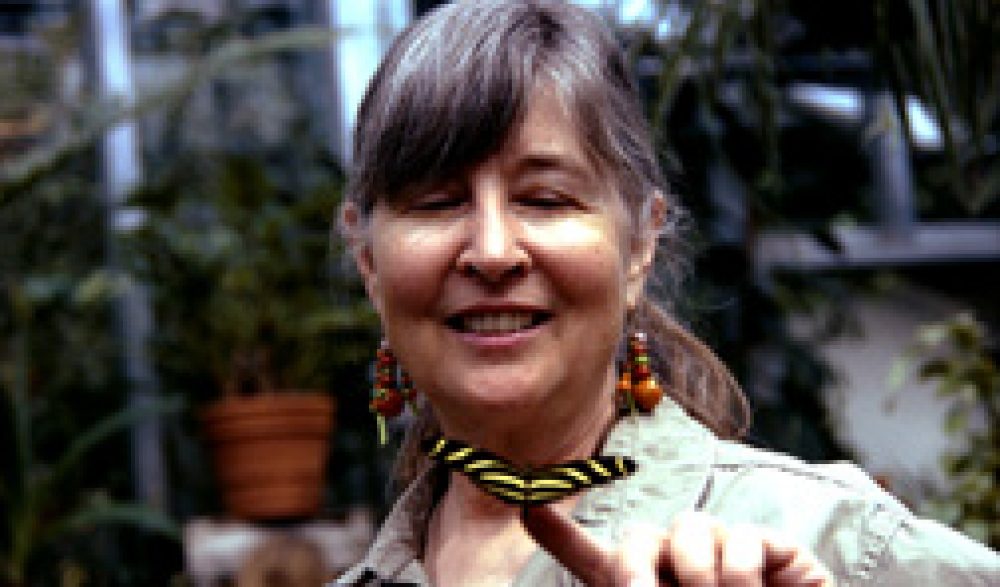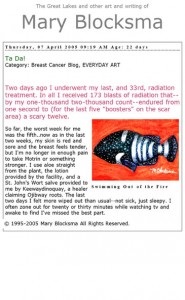I’ve resisted writing about sex because I’d like to keep my private life private, but after the Wall Street Journal article on patient blogs announced to the world that I still have a sex life, I think it’s time to talk about it. It turns out that it’d be a good thing if SOMEBODY would talk about sex after estrogen, and that somebody seems to be, for one, anyway, me.
One of my first panics, upon being diagnosed with breast cancer and having to quit the next day Hormone Replacement Therapy cold turkey, and apart from dying before what I considered my time or becoming a bag lady after the bills, was not just that I’d never want sex again, or that I’d be unable to do it, or, as a single woman, that’d I’d never know intimacy again, but that, bottom line, I’d grow old alone.
The health professionals answer to my fear, when I dared voice it in some extravantly simple form, was, universally and without exception, “lubricants”. No one seemed to understand that a lubricant might not be enough to save me from growing old alone or drying up into invisibility. (A good lubricant is a start, however, and it’s good to talk with someone who knows about those things and can talk professionally and without embarrassment about them. I called Good Vibes, and had an actual intelligent conversation when I explained the problem of estrogen withdrawal dryness. These days, thank God, lubricant choices abound and I have now about a dozen samples.)
My fears went from panic to freak-out when I had a bad experience with an insensitive partner (a lapse in judgement on my part because I would have done almost anything to be held, even for an hour, although after that experience I changed my mind about that) about a month after my first surgery, my first encounter after two months off estrogen. Sex was unpleasant and painful and I got a bladder infection and I thought my love life was over. It didn’t help that I was scheduled for six months of cancer treatment, including a relumpectomy, a sentinel node dissection, and thirty-three radiation treatments. Would sex, which until that day had gotten better by the decade (and I’m well over fifty), hereafter and forever make me sick?
It turns out, however, five months later, that I’m just fine. A compatible sweetie (not the bad experience person) who tells me I’m hotter than ever and enjoys patiently making this pronouncement come true has convinced me that Premarin wasn’t my Prozac after all.
So that’s my experience to date: I’m seven months off HRT and four months into Arimidex, that shuts off ALL the estrogen my body makes, an alternative to Tomoxafin, which shuts off only the estrogen receivers in the breast. I’m operating on zero and still, to my huge surprise, doing better than ever. Really. I decided I’d be true to my feelings, love who I loved and not waste time holding out to protect my heart. And I dyed my hair red, which all my friends say suits me. I always wanted to be a redhead. It’s time to do those little things, so easy, that, well, what would people think?
This is meant as an encouragement to women who are worried about drying up and instantly aging. I don’t think it has to be so. Good diet, exercise, enjoying every moment possible go a long way to recovered energy, and hardly anything is sexier than energy. Perhaps the advice I’ve heard many times applies here too: “Once a fox, always a fox.” If you always loved sex, you always will. If you never did, it’s a tough place to start. But hey! We cancer survivors ARE tough. Maybe it’s exactly the right place to start.
I’ve received emails from women who’d like to start a private chat group about sex and breast cancer. If you’d like to be in on it, or if you have your own reassuring story, please email me. I’ll pass along nothing without your permission.

